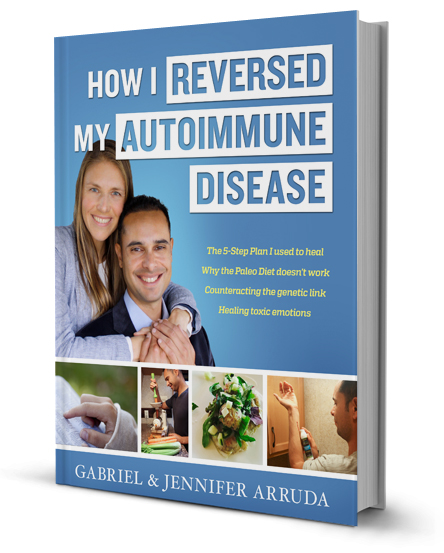10 Scary Symptoms and Signs You Have an Autoimmune Disease
1. Joint & Muscle Pain
This is one of if not the most commonly reported autoimmune symptoms.
Which autoimmune conditions is it associated with?
- Joint pain and joint stiffness is common w many autoimmune conditions such as, rheumatoid arthritis, lupus, Sjogren’s, and autoimmune thyroid diseases like Hashimoto's and graves disease.
- Muscle pain is a common symptom Fibromyalgia, MS, rheumatoid arthritis, as well as Hashimotos and graves disease.
- Abdomen pain is most frequently associated with Crohn’s disease, Ulcerative Colitis, or Celiac disease.
CAUSE: The pain in these conditions can be caused by inflammation from the immune system attacking either the lining of the joints or the intestine wall.
With muscle pain studies suggest that chronic stress or physical trauma may lead to changes in hormones and neurotransmitters, causing muscle pain like seen in fibromyalgia.
Also it’s also suggested that the brains inability to drown out pain signals in fibromyalgia and other autoimmune patients is inhibited causing a hypersensitivity to pain.
We only feel about 25% of the pain signals sent to our brain. The brain filters out which are true concerns and which are not. This can be inhibited in autoimmune pain conditions.
2. Chronic fatigue
Fatigue is an incredibly common autoimmune symptom found in virtually all autoimmune diseases. A few of the more prevalent autoimmune dis associated w fatigue are:
- Rheumatoid arthritis
- Lupus
- Sjogren’s Syndrome
- Hashimoto's
- Crohn’s
- Type 1 diabetes
- MS
However also could be a sign of a lot of other issues: Chronic Viral/bacterial infection (lyme), mold infection, and heavy metal poisoning.
The immune system uses lots of energy. Normally this is ok when it’s just taking care of the normal everyday exposure to toxins. However when your body is also attacking yourself on top of that it causes an abnormally high energy demand.
Additionally many of the toxins that cause autoimmunity also attack the bodies energy centers like the thyroid and mitochondria causing a lack of supply.
So the combo of a high energy demand plus a low energy supply causes extreme fatigue.
3. Rash and Hives
Rashes can come in a variety of ways in autoimmune diseases.
Rashes are very common with lupus which has three forms of skin disease called Cutaneous lupus erythematosus.
Lupus also has the signature the butterfly rash that appears on both cheeks and goes across the nose giving a butterfly shape.
There is a very common AI disease Psoriasis in which the overactive immune system speeds up the life cycle of skin cells causes cells to build up rapidly on the surface of the skin.
Both type 1 diabetes and thyroid disease can cause dry itchy skin.
Crohn’s disease cause rashes, and there is also a contidion called dermatomyositis which is a skin rash on the face, shoulders, upper chest, and back, and around the knuckles.
Another autoimmune rash called autoimmune urticaria causes raised red areas that don’t itch but they are very painful and burn like nerve pain.
Eczema which is inflammation of the skin can be autoimmune induced.
The Cause: The causes of these rashes vary, but commonly rashes are either caused by:
- Overactive immune system irritating the skin
- Inflammation in organ systems or blood vessels that are connected to the skin
- The bodies effort to try to remove toxins through the skin
4. Migraine/Headache
Migraines and Headaches are common in the following autoimmune diseases:
- Lupus
- Raynaud disease
- Systemic sclerosis
- Anti-phospho-lipid antibody syndrome
- RA
- Sjögren’s syndrome
Another autoimmune condition that can cause headaches is Vasculitis. In vasculitis the Immune system attacks the blood vessels including those in the brain which causes them to become inflamed causing a headache. A few of these autoimmune conditions that have this feature include Behcet's disease, Kawasaki disease and Cogan's syndrome.
The Cause: Autoimmune headaches can be caused by inflammation of the blood vessels in the brain due to toxic substances irritating them and vasoconstriction or vaso-dilation meaning when the brain get’s too much or too little blood. Having either too much or too little blood results in pressure on the brain causing a headache.
5. Depression
A 2017 study reviewing research done on over eight thousand people found that those with an autoimmune disease were much more likely to experience depression, and those with depression were much more likely to develop an autoimmune disease.
This was found to be especially true with rheumatoid arthritis, multiple sclerosis, and inflammatory bowel diseases.
The Cause: There is a lot of research showing the frequent link between depression and inflammation in the brain. This is significant since it’s also very well known that inflammation is a foundational factor in autoimmunity.
Brain scans have shown that depression is linked with an under active brain. Many of the toxins know to cause autoimmunity suppress normal brain function.
Anxiety can also be an additional issues which comes along with depression.
6. Brain fog
Brain fog is often associated with the last symptom we just looked at, depression. This is due to a lowered activity in the brain.
Brain fog is also called mental fog, is a feeling of mental cloudiness described as feeling “foggy". People who experience this say they have a difficult time thinking clearly and focusing.
Brain fog is common with autoimmune conditions like:
- MS
- Lupus
- Fibromyalgia
- RA
Brain fog is also a very common symptom of gluten sensitivity.
The Cause: Our brain has a barrier around it called the blood brain barrier which keeps out harmful substances. When inflammation occurs near the BBB, it gets inflamed, and broken down making it permeable allowing toxins to come in and cause a lot of problems including brain fog.
Additionally we can back up even further and say that Brain fog can also occur in response to a damaged gut.
The intestines also has a protective barrier to keep toxins out. If damaged and broken down the damaged gut barrier allows toxins to get through. Eventually these toxins get to the brain by damaging the blood brain barrier and then cause brain fog.
Therefore brain fog is common with autoimmune gastrointestinal diseases such as Celiac disease, Crohns disease, and ulcerative colitis.
7. Gastrointestinal distress
Gastrointestinal distress involves stomach cramping, bloating, gas, constipation, diarrhea, and even vomiting.
You would obviously have this with autoimmune diseases like Celiac disease, Crohns disease, and ulcerative colitis because those diseases involve a damaged gut, but gastrointestinal distress is also common with many other autoimmune diseases.
The Cause: Many autoimmune patients have gastrointestinal distress because they are dealing with two other issues that lie at the foundation of most all autoimmune diseases called, leaky gut and gut dysbiosis.
Leaky gut is when your small intestine damaged to the point of having microscopic holes in it that let all kinds of toxins into the blood stream.
Gut dysbiosis is when there is an imbalance of too much bad gut bacteria than there is good gut bacteria in the intestines.
These two conditions often come together and inhibits the intestines from being able to completely digest food.
These two gut issues cause malabsorption and nutrient deficiencies which can develop into food allergies that trigger things like headaches and rashes.
This leads us to our next symptom.
8. Food allergies
A food allergy is when the immune system identifies a certain food that’s been eaten as a poison and launches an immune attack on it.
Food allergies are often the source of many of the other symptoms we’ve already looked at like headaches, rashes, fatigue, stomach pain and joint pain.
As just mentioned food allergies often as a result of leaky gut and gut dysbiosis. However they can also occur because a certain food that’s being eaten is in fact bad for the body and therefore the body is launching an immune attack against it.
If the food is being ingested regularly the attack occurs regularly wearing down the lining of the small intestine leading to more leaky gut syndrome.
Afterwards the leaky gut syndrome leads to an autoimmune disease.
9. Dry burning eyes
They eyes need constant moisture and have glands that provide them regular moisture throughout the day.
In certain autoimmune diseases however the immune system targets and attacks these glands that make tears and saliva like in Sjogren’s syndrome.
Other autoimmune diseases like lupus, and rheumatoid arthritis can attack the tear glands also. Autoimmune thyroid disorders like Graves disease and Hashimoto’s can also cause dry eyes. This is especially true with Graves' disease since it can affect the muscles around your eyes. Causing the eye lids to pull back from the socket making it hard for the eyes to close tight, and so the moisture evaporates too fast.
10. Neuropathy
Neuropathy is weakness, numbness, tingling and pain from nerve damage, usually in the hands and feet.
This symptom is most common the the autoimmune disease although it also often happens in
- MS
- Sjogren's syndrome
- Lupus
- Rheumatoid arthritis
- Celiac disease
- Guillain-Barre syndrome
- Myasthenia gravis
- ALS (Lou Gerigs)
The Cause: Autoimmune nephropathy happens through the immune system attacking the nerves. It also can occur as a result of what we eat.
High blood sugar and high blood fat levels (as found in diabetes) can damage your nerves and the small blood vessels that nourish your nerves.
Learn the same protocol that reversed my Autoimmune Disease!
In my book you'll learn...
- Why autoimmune diseases happen.
- The common toxins that trigger flare ups.
- How to stop further damage from happening.
- How to heal gut damage.
- How to get your immune system to function properly again.
- How to reverse autoimmunity and stay well.

Softcover
- Physical book and manual.
- Handy checklists and worksheets you can fill out.
- Shipped to your door.
eBook
- Instant access.
- Digital pdf download.
- Convenient to read on your phone, tablet, or computer.
Softcover & eBook
- Get both the physical and digital versions of the book and manual.
- Instant access with the eBook.
- Softcover shipped to your door.

My Guarantee Is:
If you are not satisfied with this book for any reason, it’s free!
Just contact me at support@reverseautoimmune.com within 60 days of the purchase, and I’ll give you a 100% back refund no questions asked.
(Shipping costs are non-refundable.)





